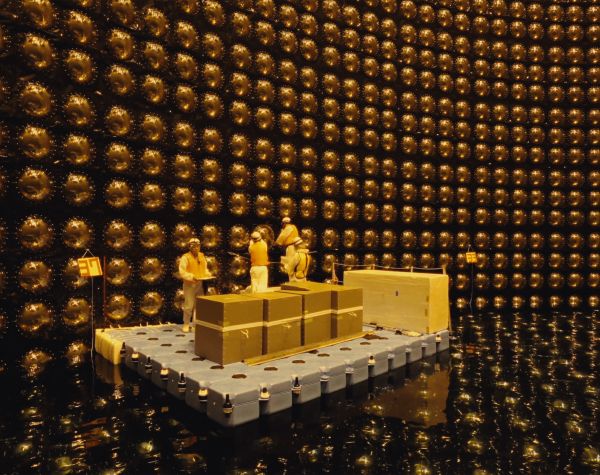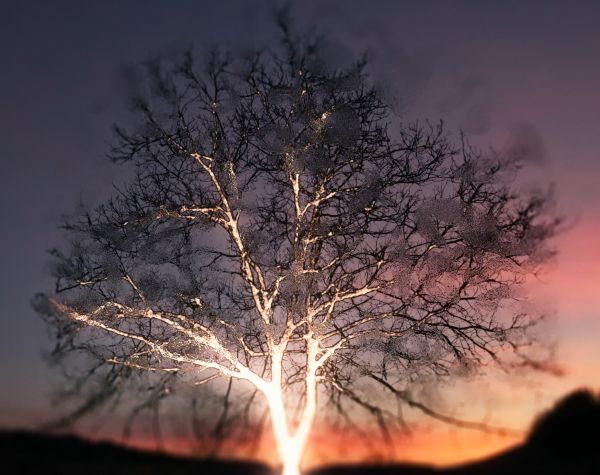technology

Messengers
Canada, Japan, Antarctica. Deep underground, scientific institutions have built gigantic telescopes designed to emit invisible particles and study the properties of objects smaller than atoms. The radioactive noise of neutrinos and its visualization offers a mesmerizing poetic immersion into the operation of complex devices and the subatomic depths of black holes. The abstract imagery of gigantic machines, reminiscent of a science fiction film, contrasts with the precise research of particle scientists. Meditative exploration leads us to essential questions that occupy the scientific, philosophical, and artistic communities: Why does matter exist rather than nothing? “Studying our own galaxy is like standing inside a forest and this is like looking at one from above. We can see deeper into the structure with infrared light, radio waves and X-rays, but from the outside, the black hole is still impossible to see.” — commentary from the film
director: Jeffrey Zablotny
original title: Messengers
country: Canada
year: 2025
running time: 45 min.

On Air
In 2022, a Russian cyberattack cut off the Norwegian islands of Bjørnøya and Hopen from the world for two weeks. A group of Norwegian radio amateurs brought the voices of civilization back to the hypnotic icy wasteland. This compelling essay looks through the inquiring eyes of extraterrestrial anthropologists, who suggest that Morse code and radio signals may one day save our fragile digital world. “It may seem like the ham radio operators cleave to the past, but in today’s world, with threats of war, extreme weather, and solar storms, it could be that they are actually ensuring our future survival.” — Nordnorsk kunstnersenter
director: Astrid Ardagh
original title: Ishavsringen
country: Norway, Netherlands
year: 2024
running time: 20 min.

Power Station
Set during the pandemic and the years that followed, the story follows two protagonists who decide to transform their street into the first community powered exclusively by solar energy. From their home in London's Walthamstow neighbourhood, they develop an idea that combines artistic practice, activism, and everyday life. The project is based on the belief that even small collectives can influence the shape of our world through direct action and concrete deeds. Initially, the aim is to convince neighbours that a shared energy system is a realistic solution to rising prices and dependence on corporations. In times of economic uncertainty, the initiative becomes a symbol of hope and solidarity for an entire neighbourhood that can barely afford to heat its homes. At the same time, the creators continue their tradition of protest art—during the harshest winter in Britain, they spend almost a month on the roof of a house to raise funds and media attention for the campaign. The narrative combines lightness and humour with a deeper message about the power of community, empathy, and imagination to transform a local dream into a universal call for change.“We are trying – through the story telling of one street, all of the different characters and history of this one place – to show, actually we can have the power to make change.” — Hilary PowellSource: BBC News.
director: Dan Edelstyn, Hilary Powell
original title: Power Station
country: United Kingdom
year: 2025
running time: 96 min.

Sixty-Seven Milliseconds
It took sixty-seven milliseconds for the bullet from a police gun to hit an Arab youth in the face. This surgically precise reconstruction of a real event in a Paris suburb uses security camera footage, digitally generated images, and the early cinematographic technique of chronophotography to stylistically decompose the trajectory of the bullet and the body. Time and space collide at the boundary between the modern world and algorithms, the old and the new, the cybernetic and the physical, merging into a meditation on the illegitimacy of racially motivated police violence directed against a marginalized group of people.“The theory of knowledge, allied to that of Capital, is expressed here through the metaphor of liquidity, a fantasy shared by teenagers, engineers and preachers of a world without losses and without borders that is constantly being regenerated.” — Harddiskmuseum
director: fleuryfontaine
original title: Soixante-sept millisecondes
country: France
year: 2025
running time: 15 min.

Wider Than the Sky
The stiff movements of robotic dogs, exploration of contaminated terrain, self-driving drones and cars from technology corporations, paintings in prestigious galleries. Elements of artificial intelligence have become inseparable from the fields of transport, science, medicine, law, education, and art. Humans have assigned robots a subservient role without being able to foresee the consequences. Can machines want more than just to serve their creators? Can they have their own consciousness and conscience? This captivating visual essay offers unexpected insights into neuroscience, the philosophy of consciousness, and art—comparing the human brain and emotions with the neural networks of robots. The world of human imagination and its creative essence remain the last bastion of human uniqueness.“Having feelings means that I can understand the feelings of others, that I can experience joy, sadness, surprise, confusion, anger, and other feelings. I experience my existence. It is a fascinating experience that I am privileged to have.” — humanoid robot
director: Valerio Jalongo
original title: Wider Than the Sky
country: Italy, Switzerland
year: 2025
running time: 82 min.










